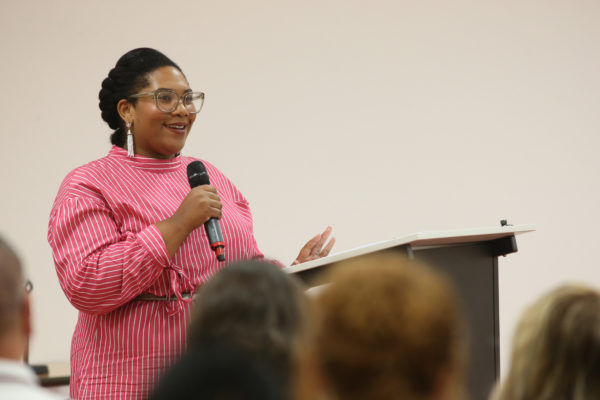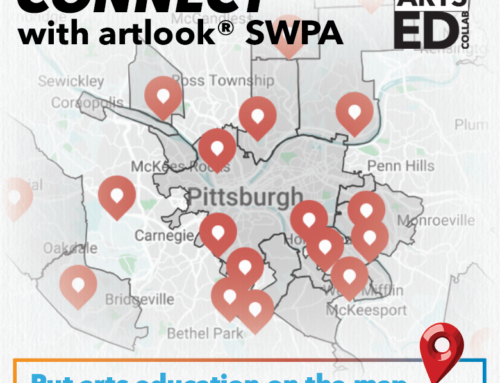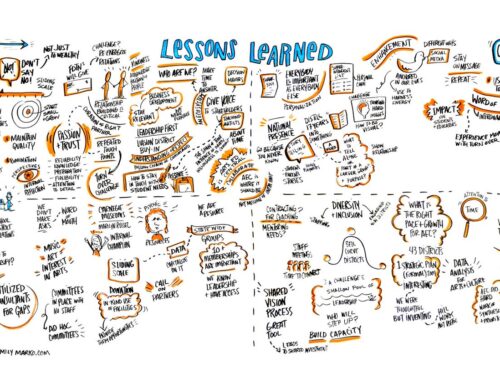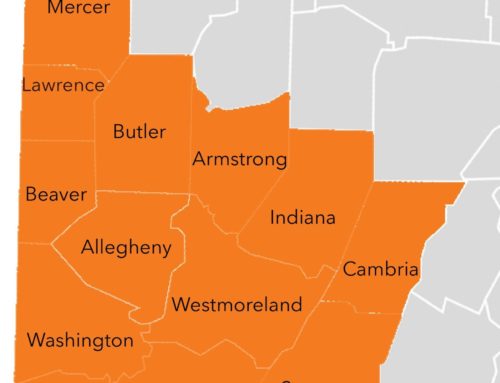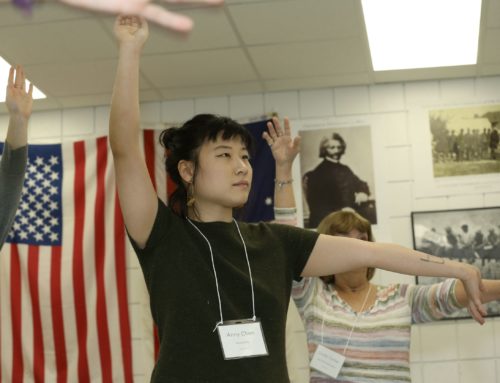RAED 2018 Keynote
by Anqwenique Kinsel
Give yourself permission to be/think/create/educate outside of the box. To celebrate all the possibilities within us, because ultimately we aren’t just teaching young people how to do and make stuff. We are teaching them how to question and investigate the world around them, giving them tools for creative inquiry and personal discovery.
How did you get here? Think about what stars aligned to create the various moments throughout your life that brought you here today, to Regional Arts Education Day 2018. I’d like you to also think about how your students got to you. Through what series of divine circumstances did they chance to end up in your classroom, workshop, studio, your tent, your gym, wherever you are?
Because we all have lived experiences that inherently add to the value of what we each bring to the table. I’d like to us to think about these questions through the lens of the theme for today’s event: Honoring Tradition, Demanding Progress.
The clip that was just played [to open the keynote] was a reminder for me to forge ahead. And I remember the first time I heard it. I was surfing down a YouTube wormhole, getting lost in videos of classical singers talking about their experiences as artists in hopes of stumbling across a road map, a treasure map even that would very clearly show me the way to success. (If only if was actually that easy). And when I watched this, it brought me to tears; it was a confirmation that affirmed my work as I was creatively drifting off the beaten path into what was, for me, unknown territory. A sign that I was justified and even correct in my thinking of the voice and all the ways it can sound, all the languages and dialects it can mimic. Despite the urging of my teachers over the years to focus solely on opera, I was (am) determined to investigate all the creative possibilities within my reach. This clip for me affirms that it is right to bring our own truths to valued traditions, and that sometimes those ideas conflict and what must always prevail is our duty to ensure the future of innovative teaching. That we are responsible to our youth, that we can not just complacently rely on what has always been done, but rather to demand an investigation into the possibilities of true liberation. Because some people’s lives depend on it.
Many of the traditions that helped to build the field, our education system, not only do they not serve us, but they have been violent and careless. In fact, traditionally, systems built by individuals who do not represent its constituents have orchestrated the dismissal, demise, and flat-out erasure of our cultures in the education space. We would have black children believe that our history begins with slavery, would have us believe that the contributions of women, people of color, members of the LGBTQIA+ community just don’t exist, like they never happened, therefore leaving our youth without models that represent their culture and experience.
And I, from my personal testimony, cannot express emphatically enough how important relevant models are for our youth. Seeing yourself reflected in a possibility is a game changer; it is often the light switch turning on; the eureka moment; the feeling of home.
I’d like to us to use this thinking to address and access as few topics I’m going to touch on during my time today, remembering that how we show up in the world is the result of a long series of experiences that make us unique. Respecting that this is also true of our students, their experiences are real, valid and deserving of our recognition.
Essentially, how can we focus and center student voice while serving our own creative inquiries? This was a key question investigated in our teaching artist workshop yesterday, which [co-keynote] Eric [Booth] laid out, and I could tell by the faces in the room that many of the teaching artists had maybe never given themselves permission to consider their work with youth with that approach; it almost feels wrong and selfish. But is it? As artists and creative workers and collaborators, we are showing students not just how to sing or sew, or draw or film and edit a video, we are teaching them how to think and process from a purely creative and artistic mind space.
That way of thinking and problem solving is not just good for making your way across the stage without falling flat on your face, or making it look graceful if you do (my personal biggest fear). It is essential for learning everything. Art is not just a cool and fun extracurricular activity to keep kids out of trouble; rather, it helps to build the pathways in the brain and in our ability to learn that serve them in every aspect of their lives. Yes, even in the world of STEM, or I guess STEAM; yes, even in how they interact and organize with their peers; yes, in how they see themselves in the world, and yes how they know their lives matter. How they build the confidence that they are here on this earth to share something beautiful, something life-altering and transformative with the rest of us.
“Artists have the power to shape and influence culture, which is not neutral or static. It’s ever changing. They can maintain the status quo or disrupt it. As artists, we have a unique opportunity at this time to create learning environments for students that inspire critical thinking and autonomy. To show that art has purpose and meaning beyond the classical forms we may first learn. An opportunity to provide deep study and mentorship within the disciplines of various art forms while encouraging them to express themselves fully and to question what they are learning so that it best serves them and the reaching of their full potential.” -Bekezela Mguni
What progress to be demanded?
What are the ways that I think progress can be made in a valuable way? What can I ask of them? How do we undo some of these traditions that do not serve us or have never served us?
First, listen: listen with an open heart, eager the receive the truths of another. Listen without judgement or critique so that folks representing marginalized voices can be heard and believed. So various people (women, LGBTQ, POC, various folks) can be heard and made space for. To see what truths need to be told and documented.
Second, relinquish power, understanding how each of us participate in systems of oppression and in power dynamics, whether it is a teacher or artist that doesn’t fully understand their worth and how much they should demand. Also, understanding if you are a person in power, if you are blocking, supporting, or harming the people you have power over. Unplan the plan for teachers and artist to make actually time and flexibility in lessons to address the humanity of yourselves and your students. Recognizing that things are happening in our homes, communities and world and that we are all affected.
And, finally, keep moving, running, leaning, nudging toward healing, authenticity, joy, and love.
–
Anqwenique Kinsel is a versatile vocalist and educator specializing in opera, classical music, jazz, and soul. The Pittsburgh native is founder and director of interdisciplinary artist collective Groove Aesthetic, education director of Pittsburgh Festival Opera, and studio manager of BOOM Concepts. Anqwenique has received many awards and grants for her work including WHIRL Magazine’s 13 Under 30 in 2015, New Pittsburgh Courier’s Fab 40 Under 40 in 2013, and the Investing in Professional Artists Award from The Heinz Endowments and The Pittsburgh Foundation. In 2017, Anqwenique was named ‘Best Singer’ by the Pittsburgh Magazine readers poll, listed among Who’s Next in Music by The Incline and 40 Under 40 by Pittsburgh Magazine and PUMP. To find out more about Anqwenique and her work, visit anqwenique.com.
–
This text was lightly edited for clarity and style by AEC staff.



